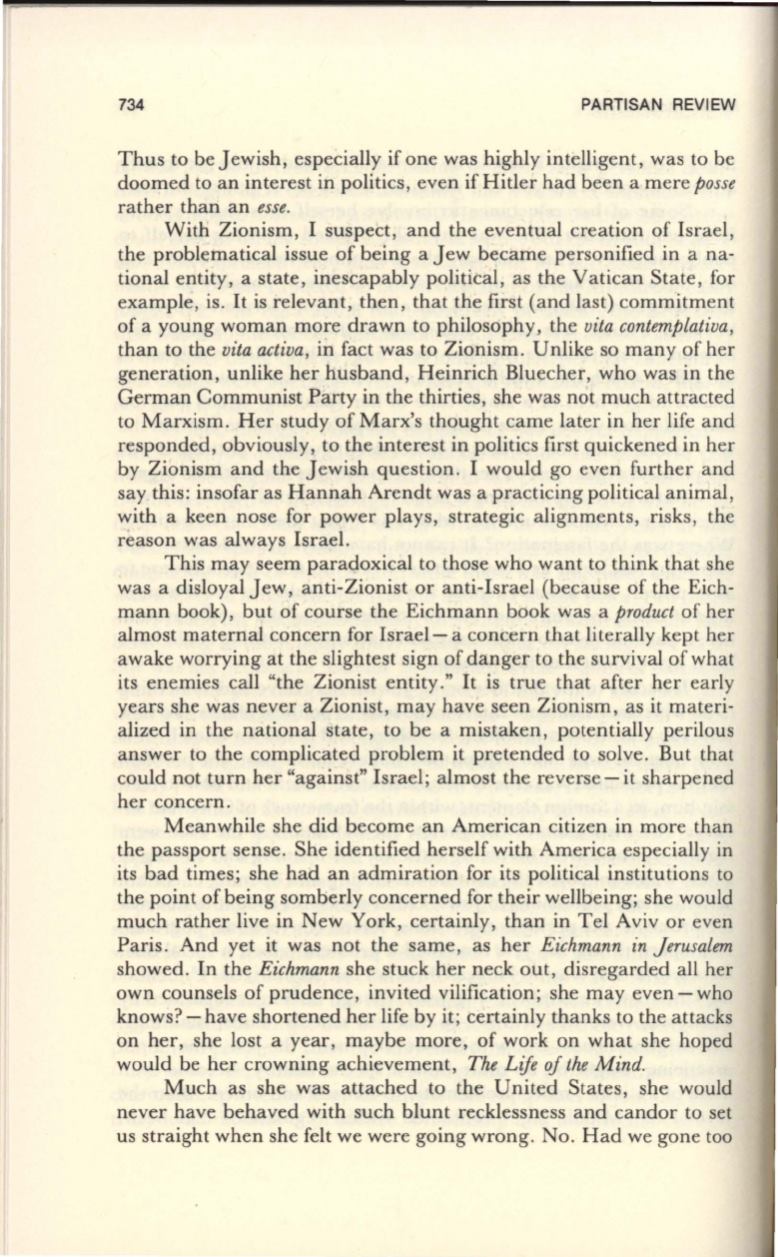
734
PARTISAN REVIEW
Thus to be Jewish, especially if one was highly intelligent, was to be
doomed to an interest in politics, even if Hitler had been a mere
posse
rather than an
esse.
With Zionism, I suspect, and the eventual creation of Israel,
the problematical issue of being a Jew became personified in a na–
tional entity, a state, inescapably political, as the Vatican State, for
example, is. It is relevant, then, that the first (and last) commitment
of a young woman more drawn to philosophy, the
vita contemplativa,
than to the
vita activa,
in fact was to Zionism. Unlike so many of her
generation, unlike her husband, Heinrich Bluecher, who was in the
German Communist Party in the thirties, she was not much attracted
to Marxism. Her study of Marx's thought came later in her life and
responded, obviously, to the interest in politics first quickened in her
by Zionism and the Jewish question. I would go even further and
say this: insofar as Hannah Arendt was a practicing political animal,
with a keen nose for power plays, strategic alignments, risks, the
reason was always Israel.
This may seem paradoxical to those who want to think that she
was a disloyal Jew, anti-Zionist or anti-Israel (because of the Eich–
mann book), but of course the Eichmann book was a
product
of her
almost maternal concern for Israel- a concern that literally kept her
awake worrying at the slightest sign of danger to the survival of what
its enemies call "the Zionist entity." It is true that after her early
years she was never a Zionist, may have seen Zionism, as it materi–
alized in the national state, to be a mistaken, potentially perilous
answer to the complicated problem it pretended to solve. But that
could not turn her "against" Israel; almost the reverse- it sharpened
her concern.
Meanwhile she did become an American citizen in more than
the passport sense. She identified herself with America especially in
its bad times; she had an admiration for its political institutions to
the point of being somberly concerned for their wellbeing; she would
much rather live in New York, certainly, than in Tel Aviv or even
Paris. And yet it was not the same, as her
Eichmann in jerusalem
showed. In the
Eichmann
she stuck her neck out, disregarded all her
own counsels of prudence, invited vilification; she may even- who
knows?- have shortened her life by it; certainly thanks to the attacks
on her, she lost a year, maybe more, of work on what she hoped
would be her crowning achievement,
The Life of the Mind.
Much as she was attached to the United States, she would
never have behaved with such blunt recklessness and candor to set
us straight when she felt we were going wrong. No. Had we gone too


